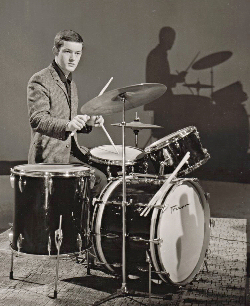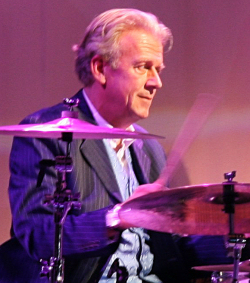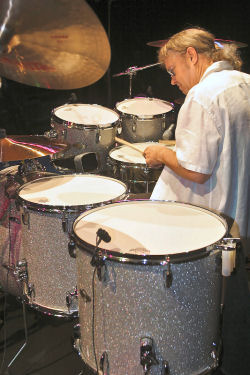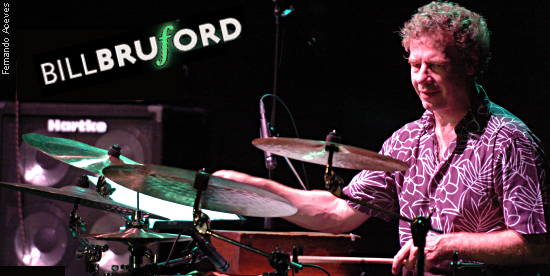
We recently caught up with Bill Bruford and threw a few interesting questions his way. What resulted was a facinating look into the mind of a British Drumming legend!
What”s the job of a drummer in a band?
Well it depends on the band and what it wants to do. At the basic level its to look cute and wave your arms about, and maybe “keep time” with the basic rock beat ( if the other guys can”t keep their own ..). There is a long and distinguished lineage of drummer-as-showman, which runs from Vaudeville, Zutty Singleton and Chick Webb all the way through all the stick-twirlers, to Carl Palmer taking his shirt off, while ringing a bell with his teeth, on up to today”s blood and thunder stick-twirlers. So some guys do more or less of that. Further up the food chain you get the guys who tend to avoid that, who consider showmanship a distraction from the music, who prefer to be considered as musicians rather than entertainers, and who operate in a musical context which will permit the most rarified and breathtaking performances. You”ll hear endless variations, impossible dexterity, complete dynamic control, lateral thinking, the ability to turn on a dime, the ability to invent, invent, and then invent some more. You”ll be listening to someone who controls the band from the drum stool through his phrasing and dynamics a bit like a rider rides a horse, who ebbs and flows like the wind and the tide, all while appearing unhurried, relaxed, and totally swinging in perfect tempo. Oh, and he”s probably reading it.Then you”re dealing with Bill Stewart or Jack de Johnette or Gary Husband or Mark Guiliana, and it doesn”t get much higher.
Do you practice much?
Not enough.
Do you teach? If so, what has it taught you?
Currently teaching at the A.C.M Guildford and Kingston University here in the UK. I don”t take private students. Its taught me that there is a lot more to teaching than meets the eye, and that there are huge gaps in my technical knowledge– which is what you might expect from someone who is street-trained. I”m from the last generation that seemed to be able to sort of make it up as we went along; now you need a 45 minute DVD on how to tune a drum before you can get started, apparently. But generally education on the set is way better now than it used to be, and the standard is shooting up for those drummers willing to put in the sweat.
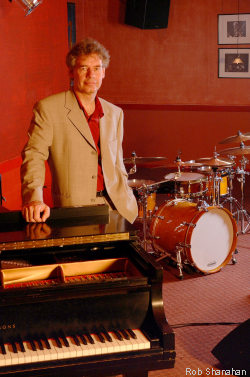
Bill Bruford
You”ve played some very different kits in a wide variety of bands but you always have an instantly recognisable sound: did you try to cultivate an idiosyncratic playing style?
No, I just tried to make something interesting to my ears, and that”s all I”m still trying to do. Nothing has changed. I don”t know about this “instantly recognisable sound” business; I must have played a wider range and assortment of electronic and acoustic drums on record and in public than any other guy alive. If I was famous for 10 minutes, it was for the clanging open metal snare drum on Roundabout by Yes in 1972. I never played that drum again after that year.
So where does this “recognisable sound” come from? Obviously not the instruments.
Two places, actually; first, the touch of the drummer, the way the stick actually strikes the head, and second, the placement of the beat. If Tony Williams played my kit, he would have sounded like Tony Williams; and if I”d played his, I would have sounded like me. That”s because these two things that a drummer has, touch and placement, are portable, transferable and mostly incapable of being copied. Don”t tell the drum companies that though! If you can recognise me at all, its because of the way I go about things on a set.
Are British musicians different from American musicians?
Britons are different from Americans, and it shows in their respective drummers. Broadly, Americans applaud the work ethic, and avoid sneering at someone who has obviously worked hard and who isn”t afraid to show it. Here, any overt evidence of effort must be hidden at all costs. We like to deal in “concepts” and “ideas”. I”m British to the extent that I”d rather hear a good idea poorly executed than something really tedious played really well, but how about a good idea well executed? Nothing wrong with that. In King Crimson, we had two Americans and two British players. The Brits, myself and Robert Fripp, argued late into the night about the conceptual direction for the music, while the Americans played pool. When we”d finally stopped agonising, the Americans just got on with it, probably played what they were going to play anyway, and played the shit out of it.
Can Rock musicians really improvise, or is that what makes a Jazz musician?
That”s as good a distinction betwen the two as any. Rock is based around the idea that the listener “wants” a certain type of music to proceed in a well-defined way, dependent on its genre, and he wants it repeated this way without variation. The rock musician is at the service of the customer, and the customer knows what he wants, which is the same thing as he got last time. There is little or no demand for improvisation in rock.
The jazz musician is infinitely less agreeable. Broadly speaking, his perception is that the audience is paying him to show them something they haven”t seen or heard before, and whatever it is, it won”t be the same in London on Friday as it was in Birmingham on Thursday. Broadly speaking, the jazz musician presents some material and then re-presents that in different ways–“here is the material, this is what I /we are going to do with it-tonight”. That, of course, requires a hefty amount of musical skill. For rock musicians, improvisation is wholly irrelevant; for jazz musicians, its life. Its as much an attitude as anything; want to be a human juke box or an investigator of possibilities? Take your pick. I played with rock guys for a long time, but personally I couldn”t stand the repetition; now I play with jazz guys.
Your son Alex is a fine drummer – what have you learnt from his career? Would you rather be starting out now?
You”re kidding me. It was a breeze in my day, compared to now. In London in 1967, all the good drummers were jazz or studio musicians, and there were only about 6 of them. There were only about 3 rhythms to learn; you could get by with a jazz swing, some sort of rock beat, a latin thing, and some brushes. You didn”t have to buy a DVD to figure out how to tune the drums, you didn”t have to spend a fortune on equipment, there were only two cymbals, a big one and a little one, you didn”t have to be better than Virgil Donati before anyone would give you the time of day. You could like Coltrane or Hendrix, but not both, and consequently there was no need to be able to play both.There weren”t many drummers around, so most people and other musicians thought you were great because they hadn”t got much to compare you to. How else do you think I got started!
Now its a big business, world rankings, drum polls, charts and all. You need the skin of a rhino, the cunning of a snake, the patience of Job and the stamina of an elephant. If you can survive the first 10 years and haven”t actually starved to death though, it”ll probably get better.
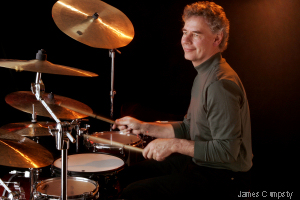 These days there are a lot more opportunities for drummers to study their instrument at college level. What effect has that had on drumming? Has it made it harder for drummers not to sound alike?
These days there are a lot more opportunities for drummers to study their instrument at college level. What effect has that had on drumming? Has it made it harder for drummers not to sound alike?
There probably is a “smoothing out” effect, given that so many students are all studying from roughly the same materials, and mostly listening to the same music. 35 years ago there were fewer drummers, no drum magazines, no DVDs, few instruction books, one pair of sticks in a lousy drum shop on Wardour Street, and your nearest fellow-drummer was probably 50 miles away. So we made it up as we went along. You got a certain charm or idiosyncracy that way. Maybe more imagination, but less competence.
Electronic drums were going to take over the world. And they did, but they”re not being played by drummers. What happened?
Basically, it was too unwieldly, expensive, and unreliable; brilliant UK design work by Dave Simmons was undercut by both poor manufacturing and the Japanese, who provided a reliable, intelligent, great sounding but unimaginative facsimile of acoustic drums in which I have no interest whatever. They are used a lot as practice kits for domestic use.
Earthworks, born 1986, was based around the idea that the electronic drumset, recently able to play all manner of chordal , sampled , pitched or un-pitched rhythmic material, had come of age, and was a serious instrument that could be used seriously in jazz. The idea was that I would play much of the chordal material, and that I would find some young open minded players from the growing UK jazz scene, which was very hot at the time, and have them play single lines on top. I knew a brilliant local tenor player that I”d used on some demos, Iain Ballamy, and he introduced me to the astonishing Django Bates. I liked both individually, but better still they were very close as people, a musical double act, a real partnership. They were essentially the backbone of the first edition, and we are now on to a second, acoustic edition of the band .
Trying to do the harmonic stuff from pads was a self -inflicted punishment that drove me crazy. Wisely, no other drummers seemed keen to leap into that particular quicksand. Any musician worth his salt always wants to push these new instruments past their design capabilities, and the manufacturer always wants a high level endorser to get behind the instrument, in this case Simmons electronic drums, often before the equipment is really ready for the market. A recipe for disaster.
I spent months, years, with hexadecimal midi-code, trying to get reluctant instruments from several manufacturesrs to co-operate, and it was a heavy ride. But the results could be spectacular–“Industry” and “No Warning” from King Crimson, “Stromboli Kicks ” from Earthworks” “Dig?”, “Bridge of Inhibition” from “Earthworks”, “All Heaven Broke Loose” from the CD of the same name. But in the fourteen or fifteen years I was actively on board, I suppose I gave rise to no more than a couple of dozen compositions which were absolutely a function of electronic percussion, and whose charm arose uniquely from that instrument. At about one a year, that’s not a great output, given the time it took. But I don”t regret a minute of it. I was then, and am now, driven by both the necessity and the desire to find interesting things to do on a drum kit.
You”ve spoken before about conscious and subconscious playing – what are the advantages of playing when you”ve exhausted all your pre-prepared perfectly-practiced chops?
Ever read “The Inner Game of Tennis” ? You have to get your conscious mind-the front part of the brain- out of the way. That”s the bit that”s always telling you what you just played , or are about to play, is rubbish. The sub-conscious mind–the rear part of the brain– will guide you admirably if only you”ll let it. Exhaustion is good as a diversionary tactic. You”re so busy complaining about how tired you are, you forget to worry about the music, and consequently play a blinder. Everyone has known that.
You”ll work if you can add value to something that”s going on around you. If you can”t, they might as well hire a machine.
What advice would you give to players just starting out now? What should they do if they want a long career?
I think it must all stem from an incurable love of music, in the broadest sense. Not what you might be able to screw out of it, but what you may be able to give to it. What can you offer? To know that , you must know yourself, have some theory and technical ability, be flexible and imaginative. There are at least a dozen music-related jobs that exist for every one guy who gets on a stage, and its certain that you will spend some of your time doing some of those. You may think I”m a drummer, but I also teach, write words and music, run a small record label, book the band, road manage, travel agent, produce and publicise the heck out of it. You”ll work if you can add value to something that”s going on around you. If you can”t, they might as well hire a machine.
What”s the best advice you”ve been given?
Stick with it. 90% of success is perseverance.
What”s your next project going to be?
2006 is a busy year for me. Its Earthworks” 20th Anniversary, incredibly, so we kicked off by releasing the long-awaited Earthworks Underground Orchestra, recorded live with a little big-band of top American guys at Iridium in New York in January. The music is freshly-arranged material from across the band”s history, and its an exciting listen. Then in February, I had the Summerfold releases The World Drummers Ensemble DualDisc ( CD audio one side, DVD the other ) with Chad Wackerman, Luis Conte, Doudou N”Diaye Rose ( the Senegalese master drummer ) and myself. We did a series of concerts early in 2004 in Europe, and this material was filmed and recorded then. Definitely one for the drummers! . I”m also gearing up to do some clinics, and continuing sporadically with Earthworks in Europe, so there”s plenty happening. And I’m doing this year’s drummer Live show. There is further info on all this of course at www.billbruford.com
Words Ed Stern


